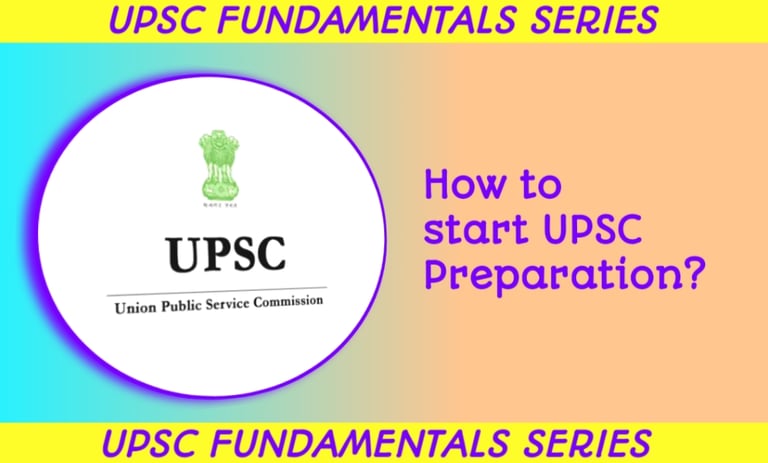How to start UPSC Preparation?
The UPSC journey is a marathon, not a sprint. It demands consistent effort, perseverance, and a strong will to succeed. Nature of the Exam: The UPSC CSE is a three-stage examination comprising: Preliminary Exam: A two-paper
HOT TOPICSFUNDAMENTAL
12/29/20246 min read


How to start UPSC CSE Preparation?
The UPSC Civil Services Examination is undoubtedly one of the most challenging and prestigious exams in India. It demands dedication, perseverance, and a well-structured approach. For those aspiring to crack this formidable test, the initial steps are crucial in laying a strong foundation for success. This post shall provide the essential aspects of starting your UPSC preparation effectively.
Understanding the UPSC Exam
Nature of the Exam: The UPSC CSE is a three-stage examination comprising:
Preliminary Exam: A two-paper objective-type test (General Studies Paper I and II (CSAT)). This stage is primarily a screening test to shortlist candidates for the main examination.
Main Exam: Consists of nine papers:
Two qualifying papers in Indian Languages and English.
Seven descriptive papers:
Essay
General Studies Papers I, II, III, and IV
Optional Subject Papers I and II
Interview: A personality test conducted by a board of eminent personalities.
Syllabus: A thorough understanding of the syllabus is paramount. Analyze each topic meticulously and identify your strengths and weaknesses.
Previous Year Question Papers: Studying previous year question papers provides valuable insights into the exam pattern, difficulty level, and the type of questions asked.
Building a Strong Foundation
Conceptual Clarity: Focus on building a strong foundation in fundamental subjects like history, geography, polity, economics, and sociology. Refer to standard textbooks and NCERTs for a comprehensive understanding.
Current Affairs: Stay updated with current affairs through newspapers (The Hindu, Indian Express), magazines (Yojana, Kurukshetra), and online resources.
Developing Analytical Skills: Enhance your analytical and critical thinking abilities through regular practice. Analyze news articles, editorials, and government policies.
Improving Reading Comprehension: Cultivate a reading habit. Read diverse materials like novels, magazines, and articles to improve your reading speed and comprehension.
Choosing Optional Subject
Factors to Consider:
Interest: Choose a subject that genuinely interests you. This will keep you motivated throughout the preparation.
Scoring Potential: Select a subject with a good scoring potential and relevant study material.
Your Background: Consider your academic background and strengths.
Exploring Options: Research different optional subjects, analyze their syllabus, and consult with mentors or seniors for guidance.
Creating a Study Plan
Time Management: Create a realistic and achievable study plan that allocates specific time slots for each subject.
Consistency: Maintain consistency in your studies. Avoid procrastination and adhere to your study schedule as closely as possible.
Regular Revision: Regular revision is crucial to reinforce learning and improve retention. Schedule regular revision sessions for each subject.
Breaks and Relaxation: Incorporate short breaks and relaxation techniques into your study schedule to avoid burnout.
Utilizing Resources Effectively
Standard Textbooks: Refer to standard textbooks and NCERTs for a comprehensive understanding of core subjects.
Coaching Institutes (Optional): Consider joining a reputable coaching institute for guidance, structured learning, and peer interaction.
Online Resources: Utilize online resources like websites, blogs, and YouTube channels for supplementary learning and current affairs updates.
Test Series: Enroll in test series to assess your progress, identify areas of improvement, and get accustomed to the exam environment.
Developing Essential Skills
Answer Writing Practice: Practice writing answers regularly. Focus on clarity, structure, and presentation. Get your answers evaluated by mentors or seniors.
Essay Writing: Develop strong essay writing skills by practicing regularly. Analyze previous year essays and identify key themes and arguments.
Communication Skills: Enhance your communication and interpersonal skills through mock interviews and group discussions.
Maintaining Motivation and Perseverance
Set Realistic Goals: Set realistic and achievable short-term and long-term goals. Celebrate your milestones to stay motivated.
Stay Positive: Maintain a positive attitude and believe in yourself. Avoid negative thoughts and distractions.
Seek Support: Connect with fellow aspirants, mentors, and family for support and encouragement.
Embrace Challenges: View challenges as opportunities for growth and learning. Learn from your mistakes and keep improving.
Taking Care of Yourself
Physical Health: Maintain a healthy lifestyle by eating nutritious food, exercising regularly, and getting sufficient sleep.
Mental Health: Practice stress management techniques like meditation, yoga, and deep breathing exercises.
Social Life: Maintain a healthy social life and spend time with loved ones to avoid burnout.
Continuous Learning and Adaptation
Stay Updated: Stay updated with current affairs and policy changes through newspapers, magazines, and online resources.
Adapt to Changes: Be flexible and adaptable to changes in the exam pattern or syllabus.
Learn from Others: Learn from the experiences of successful candidates and incorporate their strategies into your own preparation.
The Road Ahead
The UPSC journey is a marathon, not a sprint. It demands consistent effort, perseverance, and a strong will to succeed. Remember that success is not a destination but a journey. Embrace the challenges, learn from your mistakes, and never give up on your dreams.
Key Takeaways:
Understand the UPSC exam thoroughly, including its nature, syllabus, and previous year question papers.
Build a strong foundation in fundamental subjects and develop essential skills like analytical thinking, reading comprehension, and answer writing.
Create a realistic and achievable study plan, and utilize resources effectively.
Maintain motivation and perseverance throughout the journey.
Take care of your physical and mental health.
Continuously learn, adapt, and improve.
By following these guidelines and maintaining a dedicated approach, you can significantly increase your chances of success in the UPSC Civil Services Examination.
The UPSC Civil Services Examination is a formidable challenge that demands immense dedication, perseverance, and a robust spirit. While the allure of serving the nation and contributing to societal change is strong, the path to success is fraught with obstacles. This blog post will delve into the common challenges faced by UPSC aspirants and offer strategies to overcome them.
The Syllabus Juggernaut:
Overwhelming Scope: The UPSC syllabus is incredibly vast, encompassing a wide range of subjects from history and geography to economics and sociology. This sheer volume of information can be overwhelming and intimidating for many aspirants.
Solution:
Divide and Conquer: Break down the syllabus into smaller, manageable units. Focus on one topic at a time and gradually build your knowledge base.
Prioritize: Identify your strengths and weaknesses and prioritize subjects accordingly. Allocate more time to areas that require more attention.
Mind Maps and Notes: Create mind maps and concise notes to summarize key concepts and facilitate efficient revision.
The Current Affairs Conundrum:
Staying Updated: Keeping abreast of current affairs is crucial for the UPSC exam. The dynamic nature of events necessitates continuous monitoring of newspapers, magazines, and online resources.
Information Overload: The sheer volume of information available can be overwhelming and lead to information overload.
Solution:
Selective Reading: Focus on credible sources like The Hindu, Indian Express, and government publications.
Note-Making: Maintain a daily or weekly diary to summarize important news and events.
Utilize Online Resources: Explore reliable online resources like PIB, PRS Legislative Research, and government websites for concise and updated information.
The Motivation Maze:
Maintaining Consistency: Maintaining consistent study habits over an extended period can be challenging. Procrastination, distractions, and fatigue can hinder progress.
Dealing with Setbacks: Facing setbacks and disappointments is inevitable during the UPSC journey. Handling these setbacks effectively and maintaining motivation is crucial.
Solution:
Set Realistic Goals: Set achievable short-term and long-term goals to track progress and stay motivated.
Reward Yourself: Celebrate small victories and reward yourself for achieving milestones.
Find a Support System: Connect with fellow aspirants, mentors, and family for support, encouragement, and guidance.
Practice Mindfulness: Engage in mindfulness techniques like meditation and deep breathing exercises to manage stress and improve focus.
The Answer Writing Agony:
Developing Effective Writing Skills: Writing concise, well-structured, and insightful answers is a critical skill for the UPSC Main Exam.
Overcoming Writer's Block: Many aspirants struggle with writer's block and find it difficult to express their thoughts effectively on paper.
Solution:
Practice, Practice, Practice: Regular practice is key to improving answer writing skills. Write mock tests and get your answers evaluated by mentors or seniors.
Analyze Previous Year Papers: Analyze previous year question papers to understand the expected answer format and structure.
Focus on Clarity and Conciseness: Emphasize clarity, conciseness, and presentation in your answers.
Incorporate Diagrams and Flowcharts: Use diagrams and flowcharts to enhance the visual appeal and clarity of your answers.
The Financial Fret:
Coaching Costs: Coaching institutes can be expensive, and the cost of study materials, travel, and accommodation can add up significantly.
Financial Constraints: Many aspirants face financial constraints that can hinder their preparation.
Solution:
Explore Affordable Options: Consider joining affordable coaching institutes or opting for online courses.
Utilize Free Resources: Leverage free online resources like websites, blogs, and YouTube channels for supplementary learning.
Financial Planning: Create a budget and manage expenses effectively to minimize financial strain.
Seek Financial Assistance: Explore scholarships, educational loans, and other financial assistance options if needed.
The Health Hazard:
Physical and Mental Exhaustion: Long hours of study can lead to physical and mental exhaustion, affecting concentration and overall well-being.
Maintaining a Healthy Lifestyle: Balancing studies with a healthy lifestyle can be challenging, leading to issues like sleep deprivation, poor diet, and lack of physical activity.
Solution:
Prioritize Health: Incorporate regular exercise, a balanced diet, and sufficient sleep into your daily routine.
Practice Relaxation Techniques: Practice stress management techniques like meditation, yoga, and deep breathing exercises.
Take Breaks: Schedule regular breaks to avoid burnout and refresh your mind.
Seek Professional Help: Consult with a doctor or counselor if you experience significant stress or anxiety.
The Social Sacrifice:
Limited Social Interaction: The demanding nature of UPSC preparation often necessitates limiting social interactions and recreational activities.
Maintaining Relationships: Maintaining healthy relationships with friends and family while dedicating significant time to studies can be challenging.
Solution:
Communicate Effectively: Communicate your study schedule and commitments to your friends and family.
Schedule Time for Social Interaction: Allocate specific time slots for social interactions and recreational activities to maintain a healthy work-life balance.
Utilize Technology: Utilize technology to stay connected with friends and family through social media and video calls.
The Self-Doubt Spectre:
Imposter Syndrome: Many aspirants experience self-doubt and feel inadequate for the challenge.
Comparison with Others: Comparing oneself with other aspirants can lead to feelings of inadequacy and demotivation.
Solution:
Focus on Your Strengths: Focus on your strengths and accomplishments. Celebrate your progress and acknowledge your efforts.
Avoid Comparisons: Avoid comparing yourself with others. Every individual has a unique journey and pace of learning.
Seek Positive Reinforcement: Surround yourself with positive influences and seek encouragement from mentors and well-wishers.
